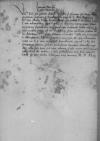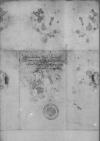Venerabilibus Dominis ⌊praelatis, canonicis et capitulo ecclesiae nostrae Varmiensis⌋, fratribus sincere nobis dilectis
Ex ⌊⌋ Fraternitatum Vestrarum XV huius datis, quantum suffragio et desiderio nostro, quin et serenissimae ⌊maiestatis regiae⌋ atque reverendissimi ⌊domini Plocensis⌋, ⌊Regni⌋ procancellarii, pro nobile domino ⌊Nicolao Locca⌋ Fraternitates Vestrae adversentur, quod et rebus in aliis non infrequenter contigit, accepimus. Praevidentes itaque, quid hinc incommodi ⌊ecclesiae nostrae⌋ ac Fraternitatibus Vestris accidere possit, ad nos vocavimus fratrem nostrum intime nobis dilectum, venerabilem dominum ⌊Achacium a Trencka⌋, ecclesiae nostrae canonicum et Allensteinensem administratorem, cui super his, quae ad mutuam inter nos et Fraternitates Vestras conservandam benevolentiam atque ad ecclesiae nostrae firmiorem statum sub his turbulentis temporibus continendum expedire nobis visa sunt, sub fraterna fiducia Fraternitatibus Vestris referre iniunximus fidemque ob id illi haberi a Fraternitatibus Vestris postulamus.
Quae bene valeant.

